Javier Bardem, Chloe Sevigny, Cooper Koch, Nicholas Alexander Chavez talk about their 'Monsters' TV series
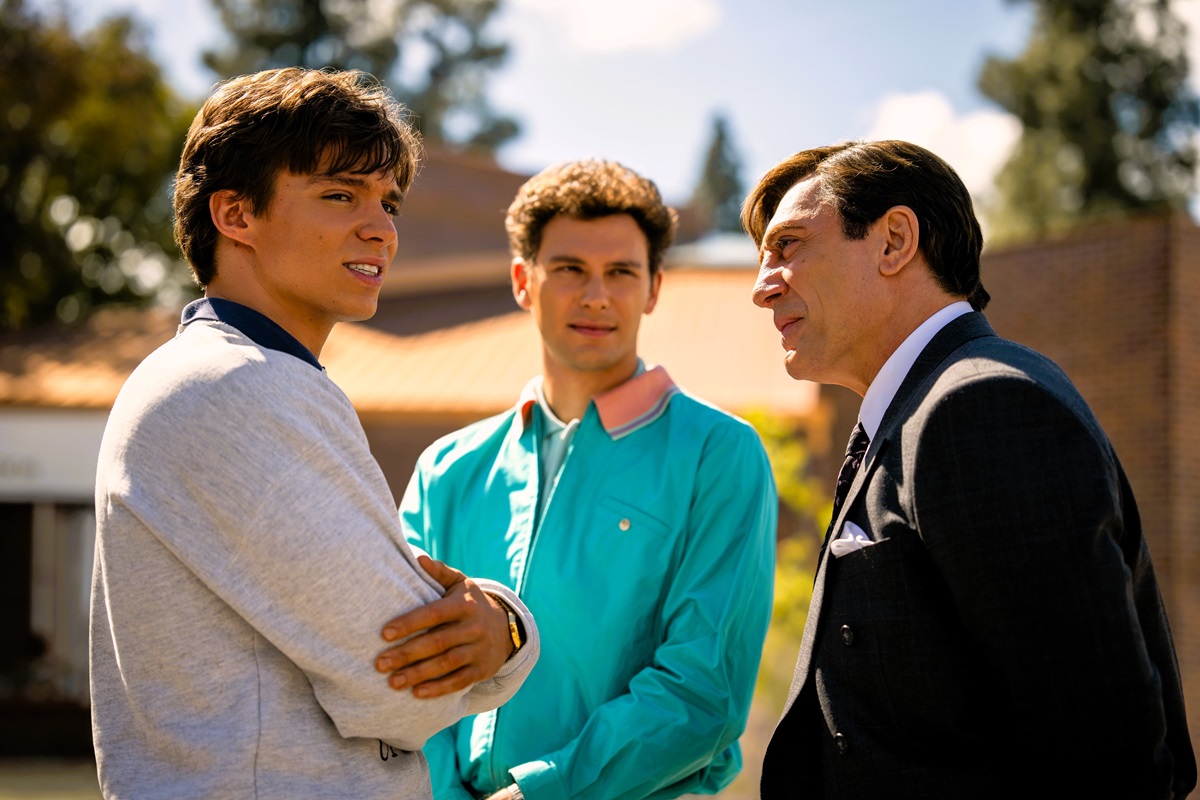
The gruesome and harrowing story of the murder of Jose and Kitty Menendez by their own sons Lyle, then 21, and Erik, then 18, in posh Beverly Hills in 1989 is still very vivid to many even after several years.
Now, with Ryan Murphy and Ian Brennan's biographical crime drama anthology TV series, "Monsters: The Lyle and Erik Menendez Story," the case is suddenly in the spotlight after over three decades.
Currently serving life behind bars, the brothers, who were accused of murdering their parents in the family's Beverly Hills home, allegedly for financial gain, are now back in the limelight as the defense argued that the brothers acted in self-defense after being abused by their father for years.
We were able to interview during a press conference the cast of "Monsters" in New York. They discussed their preparation for their very challenging roles, working with Ryan Murphy, and what they hope audiences will get from the series. Below are excerpts from our interview with Javier Bardem (Jose Menendez), Chloe Sevigny (Kitty Menendez), Nicholas Alexander Chavez (Lyle Menendez) and Cooper Koch (Erik Menendez).
Javier Bardem (Jose Mendez)
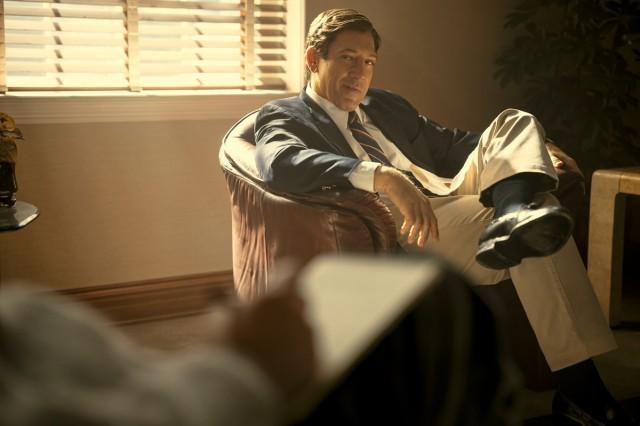
Well, in my case, there was not much out there for me to dig in. I've watched this tiny, little interview of 10 seconds where Jose Menendez had the chance to say two lines. And I was listening to those two lines. It's funny because once you go over and over, you understand that there's so much we say without saying it. The way we move the eyes and the way, so I was kind of obsessed with those two lines. But there's not much. So, I just followed the material and the great research that the team, Ryan Murphy's team did and went with it.
How difficult was it to understand the behavior of your character? In what ways did the script and your research help with that understanding?
It's a very delicate issue, and I had the time to sit down with Ryan and speak about it. He was super generous, as always, and caring. He offered me all the input and the research he did for so many years about it. So, what I did was just a leap of trust and just go there and work around the material. The material is really based on the roots of his pain in this case, his personal trauma.
Also, the way he was educated back in the day where a man is a man and has to be a man until the end of his days. Whatever that means and the wrong assumption of what a man meant in those days. The toxic masculinity we say today is something that can really cause lots of pain around the person who behaves that way. So, those two things were the base of my direction.
How challenging is exploring the darker side of human nature?
Everything is challenging. If you play a comedy, you have to be the funniest guy in the room. It's challenging as well. I think we are all here because that's what's drawn us to do what we do as a job, which is to try to understand where the joy and the pain come from, from the experience of being human, and try to experience that for the people, the audience, to get a feeling, a glimpse of where that comes from. That's what we do. We are vehicles to express that so somebody can have an experience with that and make their judgment or their ideas about that thing.
In the sense of Jose Menendez, for example, as I said before, for me was very important to understand the trauma, the pain. The way he was incapable of dealing with his pain and how much pain and suffering that creates. Now we live in a time where we can talk openly about it. We can talk about abuse. We can talk about mental health. We can talk about toxic masculinity and machismo and things like back in the day 30 years ago, it was unpronounceable, like no, you are not allowed to talk about that.
And thank God we are in a different place. Still, we need a lot of work to do.
Why do we turn vile?
If I knew, I would share. I think fear is a very important strong factor, like fear of so many things that we want to attack, rather than try to understand. It's easier to destroy rather than to construct. It takes more time to understand rather than deplore it or hate it. But in this case, what you were saying is true, that the fact that there's a house where expressions and emotions are not welcome or allowed, makes a family explode in different directions, especially when horrible things are happening. I don't know about sexual abuse. I know about physical and emotional abuse.
But that alone is horrible. It's horrifying. And that creates people who are going to suffer and make other people suffer through generations. So, that's a horrible factor, trauma.
How was it working with Ryan Murphy?
I worked with him in "Eat, Pray, Love." I knew him from before. And back then, he was so nice, so caring, so generous. I love his shows. He works so hard. He doesn't stop for a second. He does everything possible to make everybody comfortable and protected. And he surrounds himself with the best of the best of the best, no?
So, when you go to a set, everything is perfect. Like, we were in the '80s. We were in the '90s. I mean, it was amazing, every aspect of it. So, that helps you to go there and say, okay, I'm in the best hands possible.
Chloe Sevigny (Kitty Menendez)
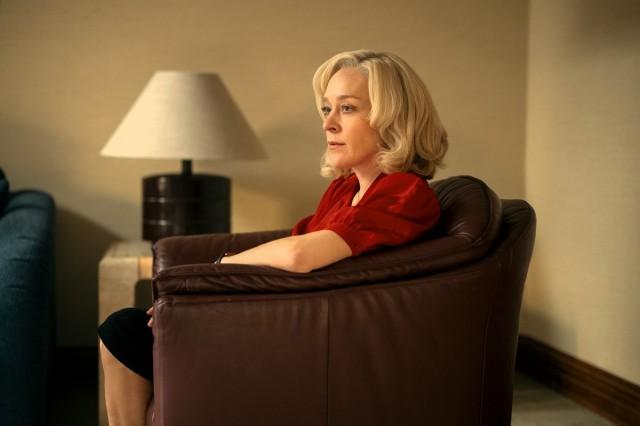
For me, there was even less on Kitty. There were a few photographs of her, but she was never on camera, or you can hear her voice. And because of the way that the creators constructed the story, and they wanted to show it from different people's points of view, different people's perspectives, I tried to stay loose as an actor. I knew that I had to be agile and be able to play her from different people's perspectives.
So, I didn't want to get locked into one idea of hers. As an actor, we always want to find the truth of the character and play that and respect that and that carries us through. In this case, I didn't have that. So, it was a challenge for me as an actor, which is always exciting, which is something you're always looking for as an actor to be able to approach a character in a new way, in a different way, and this gave that like tenfold.
What made you join this project, and could you speak more about your portrayal of Kitty Menendez?
I've done a couple of seasons of "American Horror" with Ryan, and then we did "Feud: Capote vs Swans" together. He called me and said, "We're doing a second season of 'Monsters,' and I had watched "Dahmer", and I was so impressed with how they handled that material, with the artistry of the filmmaking, with the performances. He told me a little bit about what they were going to do with this case and how they were going to examine it. I thought that was an interesting creative choice. I thought the opportunity to play this damaged woman, a flawed mother, a flawed woman, a woman who turns to the bottle, a woman who is navigating generational trauma.
Like Javier touched on a generational, leaning into gender roles and what that meant for women of a certain generation. So, I thought there was a lot to unpack there. So, I came on board out of respect for Ryan and the show and a reexamination of what happened to these boys.
How was it working with Ryan Murphy again?
Day one of rehearsals, he came in. He sat everybody down. He opened up a line of communication that I found was respectful. He wanted everybody to be open about their feelings. He wanted everybody to be comfortable. He was telling me, like, this is the story that I want to tell. This is how I want to tell it. Or we, as in the creators, him and Ian.
And just so we would have an overview, they sent out a letter to the whole crew and cast. If you find any of the material triggering in any way, we can provide support for this doctor or this way. Or like, they gave people a means and an out. If you're uncomfortable, you can walk away, no matter what department you're in or what your job is. I felt that was impressive. I, as an actor for over 30 years, have never seen that before. So, I was shocked, he was very protective of the boys.
The boys, can we just say how impressive these kids are? It's unbelievable. They're not boys. They're young men. But like, just like, wanting them to feel safe and, I said before, having this communication where we could sit around on set and talk about the scenes with one of the writers. What we were doing today or the next day, and then sharing about our lives and our own families. Just being able to be comfortable with each other and trust each other. Ryan set that tone, and I am thankful to him for doing that.
How was it working with the other cast members?
Most of my scenes were with Javier or the boys. But I think it's a testament to Ryan and the people that he surrounds himself with. Everyday player, every tiny supporting cast member, he just gets a great caliber of talent. And he has a good eye for casting.
We've seen it across all of his shows, and it also is a testament to the writing that you can have like three lines, and you can be there, your character is so alive in his world. That's just a testament to his whole team.
Why are audiences interested in true crime stories?
Life is always stranger than fiction. There's something that people want to try and get to the root of the causes, like a lot of the questions here.
The private investigators themselves get invested. Oh, I'm going to figure it out, I'm going to crack this. Even though people have been talking about it for 30 years. It's interesting to a degree. People like to do that. People want an answer, and they want insight, and they want to try and figure it out. It just plays on so many different levels and people can relate to certain things, and also think, how could that ever have happened? They're so privileged and they're this and they're that. How could they turn to this? This show, in particular, this case and this story, just has so many wild details, that it's just endlessly fascinating.
Cooper Koch (Erik Menendez)
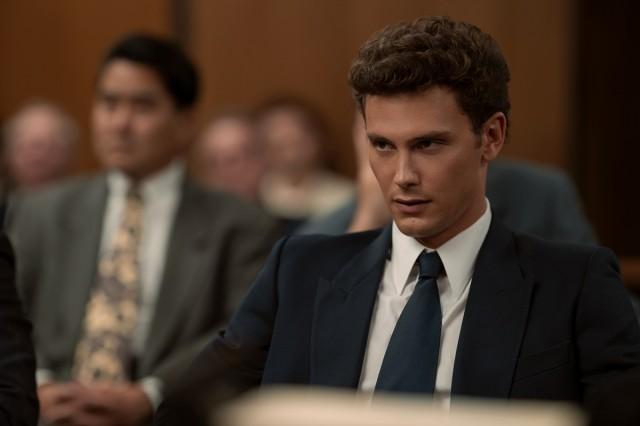
I did an enormous amount of research and just really watched as much testimony as I could. I would listen to it in the car. I would listen to it while I was going to sleep. I watched it for endless amounts of hours. It was just a lesson in empathy for me, and to understand who Erik is and why he is the way he is. It was my goal to be as authentic as possible and to just approach it with as much integrity as I could.
I want to talk a little bit about psychology because going back even to the Bible when you have Cain and Abel, there's always been this violence somehow attached to humanity. Even though we think we're born from love and everything that's kind of nurtured throughout. Did you delve into what makes us turn that switch? What makes violence come out of us or other people? Because we all watch the news and go, how could someone do that? Yet they'll do it today, tomorrow, and the next day.
I think for me, it's fear and it's a desire to love and to be loved that you are not getting from the people that you're supposed to be getting it from. And secrets and just a family that doesn't communicate and doesn't talk about their feelings, you know?
Jose Menendez was very, very diligent with his sons about not being able to talk about the way that they felt. It was always, you can't cry, you can't be emotional. You have to be a man. You have to be tough. You can't talk about… Talking about your feelings meant that you were weak. And when you're living under those circumstances, you become afraid. You become a shell of a person.
What was your preparation both mentally and physically to play a real-life figure? And how did those decisions help you provide such commanding on-screen performances?
I think like I said before, it's just a lesson in empathy. You have to hear their stories and believe them and know that what they're saying is true. Then you paint those pictures in your own mind from your own perspective, and you dig deep into your own life, and you find the connective tissue.
What steps did you take to make sure that you were authentically portraying this character and making sure it never stepped over into a space of feeling like a caricature?
For me, the connective tissue between me and Erik was shame, and that's something that I can relate to. It's something that everyone can understand in some way. It's just finding understanding, empathy and supporting it.
At least for me, I did want to make sure that I was doing some of his voice and some of his mannerisms. He holds his shoulders down. He's got a lot of tension in his mouth.
He does the sighing. He's always kind of tightening his lips and I think that was important to me because it further justifies the fact that the sexual abuse did happen, because he's so closed off, he's so shy and yeah. I wanted that. It was very important to me that I captured that in a really subtle way. That it didn't come off as like I'm trying to do an impersonation. It was still real and like dropped in.
The series features great performances from the supporting cast like Nathan Lane, Ari Graynor, and Leslie Grossman, just to name a few. Could you talk a little bit about what it was like working with them and some of the rest of the supporting cast?
Ari was my rock. She was so generous, so kind. I remember our first day together was shooting those last couple scenes in episode three. When she started speaking and I sat across from her and I saw her in a wig, it was like it was her. That was so impactful, and I didn't have to do anything.
I could just exist in what I had researched. I was going to bed listening to both of them speak, and so, it seeped into me that, like, emotional connection. We became the best of friends. I absolutely adored working with her and being across from her.
Could you please talk about shooting episode five, "The Hurt Man." Did you shoot the episode fully in one take?
We didn't do one take. We did eight. We did it over two days, and we did four. There were some stop-and-starts on the first day, because they had to figure out the technicalities of the camera and where the bag was placed and so there were a couple of stop-starts, but ultimately there were four takes, four full takes the first day, and four full takes the second day.
And is the one in the series the one that you were expecting to be?
No. I remember on the first day, it was the third take that was like, oh, that was it. I felt all the things and I did all, and I was well, okay, that was the one. Then the second day, they were all different and I felt great about all of them on the second day. They ended up choosing the very last take.
What did the preparation for that look like?
I had the script for a long time. I got cast in June and when I got cast, I got sent the first five episodes. So, I carried the script around with me everywhere. I did a lot of journaling.
I just read the script every day. I tried to not, like, quote unquote, memorize my lines, and more just like read it over and over and over and over again, to the point where it just sort of like was in me. And yeah, just really digging deep into the stories that he shares and just letting my imagination go free and trying to see what he's seeing when he's explaining them and telling them and making it so that when on the day of shooting it, when I was going to recount them, that they would just be real for me.
What do you think makes people turn that switch and go bad?
I guess the question, too, is if you're in fear for your life and you feel like you're going to be killed, what do you do? That's maybe the question. And maybe that's why violence happens.
Why do you think the audiences are so interested in this case and also in true crime stories?
It's so insane to believe that something like this could happen. Not only do two kids who were 18- and 21-years old murder their parents, but also learn that parents could sexually abuse their children.
Both of those things are so hard to wrap your head around. What they evoke in an audience is feeling. Whether it's empathy or anger. It makes you feel something, and it makes you feel passionate. That's why people are so fascinated by it, because it evokes something in you.
What was your experience working with Ryan Murphy?
I can echo what Chloe said, and I can also say that I'd never done a TV show before where you're in every episode. We didn't have all the scripts right away, so it was that cool thing where a new script was coming in. I would get it, and I would immediately read it as fast as I could. We'd get to call Ryan and talk to him about it and just go back and forth and have a dialogue. That was just so cool that I even got to have a say or got to have an opinion on something.
It just made me feel like my opinions or what I had to say was important or valid, and I so appreciate that from a showrunner and a director, or creator. It makes you feel seen, and it makes you feel like you can do your job better.
What do you hope audiences will get after watching the series?
During those days, there were no outlets for people who had experienced abuse, and maybe that's one of the reasons why the brothers didn't feel like they could do anything. But now there are so many resources for people to come out and talk about those things and get help. So, I hope for that.
Nicholas Alexander Chavez (Lyle Menendez)
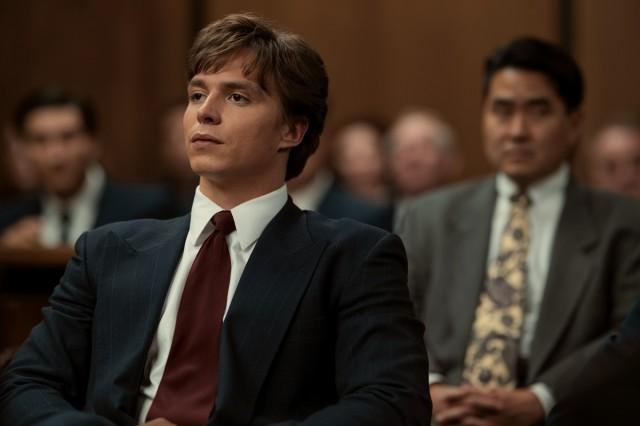
There's a tremendous amount of primary source material that you can go through. The Court TV footage as well as all of the books that were published about the Menendez Brothers, from jurors. Leslie Abramson has a book.
So, you're pulling from these primary and secondary source materials. But then to your point about how the brothers are portrayed, it was an interesting thing to navigate because this show asks who the monster is. The argument could certainly be made that one of the monsters was the media and how they portrayed the brothers during this time.
What was your preparation both mentally and physically to play real-life figures?
For me, there is an investigatory aspect of the craft where you want to try to remain as objective and judgment-free for as long as you possibly can. We were very blessed to have access to the full Court TV footage.
But then again, I was also hyper-aware of the fact that people behave very, very differently when they are in a courtroom, when the stakes are high, when they know that the case is being televised, for instance. So, you get all this rich, rich behavior, but then you have to take that and bear those other facts in mind, and then you can extrapolate that behavior to other events that happened in their life. But ultimately, it is, more than anything else, a case study in empathy. You have to search within yourself to find ways that you can relate to these brothers who went through absolutely horrific circumstances.
What steps did you take to make sure that you were authentically portraying these characters and making sure it never stepped over into a space of feeling like a caricature?
As an actor, who, what, when, and where is set out for you by the story you're telling and the script that you're being given. But how and why is up to you as an actor. You have to sit with those questions for a very, very, very long time so that you can determine answers that are justifiable to yourself and to the other creatives involved. It was important that I give that a lot of thought and a lot of attention before coming into this role.
Lyle Menendez is still alive, and he probably would be watching. So, as an actor wanting to make the role your own, how much creative liberty did you license yourself to have?
You do a tremendous amount of research going into playing a real person. But ultimately, it's a collaborative process that many people are involved with. When I came into the rehearsal room, you were coming in with a script that is prescribed by someone else. You're often getting directions from someone else. I wanted to own a performance that felt holistic and that felt like it was multifaceted.
And allowed for a wide variety of different interpretations of the character to take place. To be frank with you, I've sat with Lyle Menendez for over a year. I think he's one of the most enigmatic people I've ever come across. It is this enigmatic factor that I really hope to capture.
How was it working with Ryan?
He's a brilliant mind and has a nearly encyclopedic knowledge of a great many things, which means that his projects are very, very fleshed out and thorough. He gives a real sense of texture and feel for the time that he's going for.
It makes for just a transformative experience. To be dropped into one of his worlds and just to be able to take in and create behavior from such a lush environment of not only wardrobe and set design and all these different things. But also, the other cast that he chooses to involve, which is meticulous.
What do you hope the audiences will take away from the series?
I think that's the design of the show, right? It is to allow everyone to form their interpretation of what happened that night of August 20, 1989, and the events that led up to it, as well as the fallout that ensued.
Ultimately, there are only four people in the world who know what happened and two of them are dead. The most interesting part of this series is to see what people walk away with. I just hope it shines a light on mental health and child sexual abuse. And to just bring awareness to the fact that that still happens and it's a conversation that should continue to be talked about so that people who are victims of child sexual abuse can feel seen and more comfortable to come out and speak about their experience.
—MGP, GMA Integrated News




